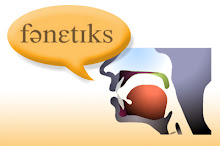Sunday, October 31, 2010
Saturday, October 30, 2010
Week 9: /ow/ as in no, cold, and tone

/ow/ as in no, cold, and tone
Another diphthong in English is /ow/. This other complex vowel has its particular way of being pronounced. It is very similar to the way it is pronounced in Spanish, for instance.
In this section, we will examine the way this sound is produced. Pay attention to the following characteristics.
- Hold the front part of your tongue low in your mouth, with the tip slightly touching the lower front teeth.
- As you begin to say the sound, raise the back of your tongue towards the roof (soft palate) of your mouth.
- Round your lips and push them forward a little.
- The opening of your mouth is smaller than for the sound /ɔ/ as in “tall.”
Pronounce the following words:
| Word | IPA |
| oh | /ow/ |
| sew | /sow/ |
| law | /lɔ/ |
| calm | /kam/ |
| talk | /tɔk/ |
| not | /nat/ |
| cut | /kʌt/ |
| nut | /nʌt/ |
| boat | /bowt/ |
| bone | /bown/ |
| abroad | /ǝ’brɔd/ |
| coal | /kowl/ |
| knot | /nɔt/ |
| soak | /sowk/ |
Now pronounce the following contrasting words.
| /ow/ | /a/ | /ʌ/ |
| note | not | nut |
| comb | calm | come |
| soak | sock | suck |
| coat | cot | cut |
| robe | rob | rub |
| phoned | fond | fund |

Week 9: Linking and Intonation with /oy/

Linking and Intonation
Each of the following sentences contains the vowel sound /oy/. Read them carefully, and consciously pronounce each vowel sound correctly. Avoid using the vowel sounds used in your native language; otherwise, this will give you a very strong accent in English.
01.Does Roy play with the toys or destroy them?
02.Don’t spoil the oil. It’s oil for cooking.
03.His voice was full of joy when he saw his
son.
04.The boys found the coin in the soil in the garden.
05.The men on the ship convoy rejoiced when they got to port.
06.Do I have a choice about wearing t
he corduroy pants?
07.The noise crowd was loyal to the Royal Couple.
08.Please point to the employment office.
09.Do you like oysters boiled or broiled?
10.She avoided the boycott in the office.
Now let’s read the following conversation. Pay attention to the natural linking among the words in the text.

| Joyce | Michael, have you read any Shakespeare’s plays yet? |
| Michael | No, I haven’t. I have not taken any literature class yet. Have you, Joyce? |
| Joyce | Well, I have to read Macbeth. I have no choice. This isn’t the kind of plays I enjoy reading. |
| Michael | Oh, boy! Isn’t the language very difficult? How can you enjoy reading it? This kind of old English gave my brother a headache. |
| Joyce | I’m just getting started with the play. And I found a few lines that I’d like you to hear. |
| Michael | Sure. Go ahead and get to read them in a loud clear voice. |
| Joyce | There are witches standing around a boiling pot. Double, double, toil, and trouble; Fire burn and cauldron bubble … Like a hell–broth boil and bubble. |
| Michael | Hey, are you frightened? |
| Joyce. | Terrified! |

Week 9: /oy/ as in boy

/oy/ as in boy
To start with, let’s pay attention to the basic components to pronounce the /oy/ vowel sound. Don’t forget that one of the best exercises for pronouncing vowel sounds is to stand in front of the mirror, and articulate the sounds as follows:
- Hold the front of your tongue low in your mouth. The back part is raised toward the roof (soft palate) of the mouth.
- Touch the lower front teeth lightly with the tip of the tongue.
- Round your lips.
- Begin the sound, then raise your jaw slightly.
- Move the front part of your tongue forward and up and move your lips back slightly.
Practice the pronunciation of /oy/ in the following sentences:
01. That’s a nice toy.
02. That’s a nice tie.
03. Don’t slip in the oil.
04. Don’t slip in the aisle.
05. Did you say “toil?”
06. Did you say “tile?”
07. It’s a foil card.
08. It’s a file card.
09. What’s the meaning of “ball?”
10. What’s the meaning of “boil?”
11. How do you pronounce soil.
12. How do you pronounce Saul.
.gif)
Week 9: What are Diphthongs?

What are Diphthongs?
Vowels in English pronunciation are classified in two different groups: Simple Vowels and Complex Vowels. Simple vowels refer to phonetic vowel characters made up of just one symbol. On the other hand, complex vowels can be easily identified because they are made up of two phonetic characters.
| Simple Vowels | Complex Vowels |
| /ɪ/ | /iy/ |
| /ɛ/ | /ey/ |
| /æ/ | /ay/ |
| /ʌ/ | /aw/ |
| /ǝ/ | /uw/ |
| /ɔ/ | /oy/ |
| /ʊ/ | /ow/ |
Complex vowels are also referred as diphthongs. Whether we use the term complex vowels or diphthongs, we are talking about the same group of vowels.
Informally speaking, so to say, we have paid attention to two complex vowels: /ay/ and /aw/. We will eventually go back to them, but this lesson will be devoted to /oy/ and /ow/.
Sunday, October 24, 2010
Sandhi Forms in English

Sandhi Forms in English
Jose Pablo Corrales (BIN-02, 3rd Quarter 2010) is asking about why some words have more than one correct pronunciation. The reason why this is happening in English is due to Sandhi Forms. Sandhi Forms refer to alternative ways of pronouncing words, which are accepted by native speakers, at times as non-standard ways of pronunciation, but valid in any case.
Jose Pablo points out why words such as where have these double forms: /hwɛǝr/ and /wɛǝr/. The reason for this duality relies on the fact that some native speakers in American English pronounce /hwɛǝr/ as the standard way, yet there are others who pronounce /wɛǝr/, as a non-standard way but accepted. For this particular issue, as an English language learner, the student should learn one of the two ways to pronounce the word and use it confidently. This rule applies for other words such as what, where, when, why, whale, wheat, etc.
| Word | Standard Form | Sandhi Form |
| what | /hwat/ | /wat/ |
| where | /hwɛǝr/ | /wɛǝr/ |
| when | /hwɛn/ | /wɛn/ |
| why | /hway/ | /way/ |
| whale | /hweyl/ | /weyl/ |
| which | /hwıtʃ/ | /wıtʃ/ |
| wheat | /hwiyt/ | /wiyt/ |
Some of these forms become homophonic forms for other words in terms of non-standard American pronunciation. For instance the words wear and where become homophones. And this is the same case for witch and which.
Finally, some pronunciation manuals use /ɔy/ to indicate the pronunciation of words such as boy, soy, toy, Troy, etc. Some other manuals use /oy/. Why is this incongruence happening? This is pointing back to what we were discussing above: Sandhi Forms. Vowel clarity differs from region to region in the United States; that is, pronunciation changes slightly or very much depending where the people are settled. It should not surprise you to find people who pronounce boy as /bɔy/ (with an open “o”) and others who pronounce the same word as /boy/. At the end, the language student must decide which of these forms is the one he/she wants to use.
| Word | Standard Form | Sandhi Form |
| soy | /sɔy/ | /soy/ |
| toy | /tɔy/ | /toy/ |
| boy | /bɔy/ | /boy/ |
| Troy | /trɔy/ | /troy/ |
| Floyd | /flɔyd/ | /floyd/ |
| destroy | /dıs’trɔy/ | /dıs’troy/ |
| annoy | /ǝ’nɔy/ | /ǝ’noy/ |
For the Pronunciation course at the university, we tend to use the /oy/ in our transcriptions.












